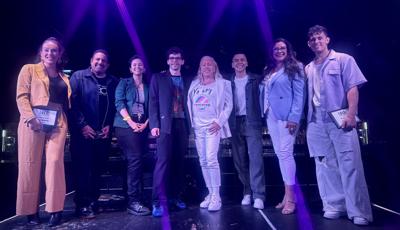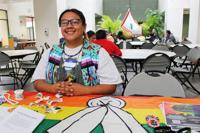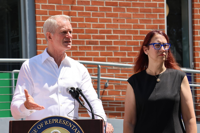
Panelists and organizers of Thursday's Dialogo. Photo by Brenda Verano
On Thursday, CALÓ News, Los Angeles Blade and the Latino Media Collaborative (LMC) hosted the Ninth Diálogo session titled “Pride, Power and Progress,” where creatives, artists, community advocates and leaders gathered to talk about the intersections of journalism, identity, and social impact.
In observance of Pride Month, the Diálogo featured speakers who were civic and community leaders and part of the LGBTQ community. Speakers included Salina EsTitties from RuPaul’s Drag Race; Andres Palencia, chief executive officer and co-founder of LatiNation; Liliana T. Pérez, director of cultural affairs at the L.A. Chargers; Bamby Salcedo, president of the TransLatin@Coalition; and Jorge Reyes Salinas, communications director at Equality California.
The Diálogo touched on the intersection of LGBTQ and Latinx issues, some of the largest and most vital communities across Los Angeles County.
The Diálogo began with open remarks from the event’s moderator and Los Angeles Blade editor, Gisselle Palomera. “[In 2025] we are not only seeing the dawn of a second [Donald] Trump administration and his slew of executive orders, but we’re also seeing nearly 1,000 proposed bills that target the LGBTQ community,” they said. “It is no shock, and it is not news to say that our communities are being attacked. So we are here this evening to not only shed light on these issues, resources and statistics but also to unite in community and refuel our energies so that we can keep the fight going.”
When it comes to issues that the LGBTQ and Latino communities face, like deportations, homophobia, toxic masculinity and hate crimes, among others, Salina EsTitties discussed the significance of learning and relearning how to be an ally or advocate.
“I’m doing the work to learn where I can; I’m asking questions. Sometimes we can't all be on the front lines, but there is always something that we can do: calling, emailing, doing the work where you can,” Salina EsTitties said. “It's about being OK where you are at. Do what you can where you are now and then you will have space to grow and move forward from there.”
Reyes Salinas talked about the way the first seven months of the second Trump administration affected the work of organizations like Equality California. He touched on the recent ICE raids and Border Patrol apprehensions that have been prevalent in Los Angeles and Southern California.
“We went from doing amazing work and really moving the needle in California to now just doing rapid response and emergency response,” he said. Reyes Salinas said that although rapid response networks are incredibly vital and important to the communities that live in fear, they have also stretched and limited staff capacity for other vital services that take a back seat because the urgency is to keep families together. “It takes away time for the work that we had advanced on doing.”
Salcedo, who has been organizing on trans and LGBTQ rights for more than 30 years, said that immigration rights and transgender rights should not be looked at separately. She also said that within immigration rights rhetoric, transgender people are often left out. “Over the years, the immigration movement has framed the issue of immigration around family separation, and although it is real, that has been exclusive to the lives and experiences of LGBTQ people, specifically trans women,” she said. “Members of our community do not have our blood family, but we create our own family and we are important to our people.”
Pérez touched on the importance, more than ever, of occupying space as our most authentic selves and our multi-identities. “Whatever space we are in, we get to occupy it in its entirety, and I hope that those spaces can give you the courage to be able to embrace your multiple identities,” she said. She also offered words of encouragement to attendees who might identify as LGBTQ or who have not yet “come out” to their families.
“[Sometimes] we have immigrant families and they’re not ready for it, and if you'd rather have a relationship with your immigrant families, you should give yourself permission to be out, but at the same time, you should give yourself permission to be out if that is what you embrace. Know that when you are out, you will have a whole village to help and be your extended family,” she added.
Palencia talked about performative allyship and authentic allyship, especially in times like these when queer, trans and undocumented people are the most targeted during the Trump administration. He said it's important to distinguish between people who really care ”and those who might not.”
“There are some places where you have to be on eggshells because you being there or people that you represent being in the spotlight could have vulnerabilities, and that can have a cascade effect that can hurt people,” he said.
Palencia said that despite the political climate of today, hope and a desire for a better future are also very prevalent among our communities. “The thing I have noticed more since the new administration happened upon us again is the ray of hope,” he said. “It’s almost like a hidden hope of us waiting for the next moment where it’s five steps forward that we can’t take back. I notice the power that we have.”










(0) comments
Welcome to the discussion.
Log In
Keep it Clean. Please avoid obscene, vulgar, lewd, racist or sexually-oriented language.
PLEASE TURN OFF YOUR CAPS LOCK.
Don't Threaten. Threats of harming another person will not be tolerated.
Be Truthful. Don't knowingly lie about anyone or anything.
Be Nice. No racism, sexism or any sort of -ism that is degrading to another person.
Be Proactive. Use the 'Report' link on each comment to let us know of abusive posts.
Share with Us. We'd love to hear eyewitness accounts, the history behind an article.